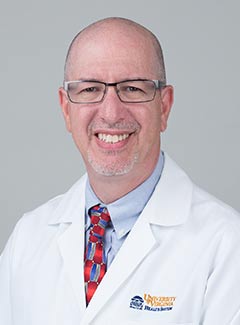
Title: Professor
Fellowship: Pulmonary and Critical Care, University of Chicago
Residency: Internal Medicine, University of California at Davis
Medical Degree: University of Arizona
Master of Science: Human Physiology, Georgetown University
Imre Noth, MD, is an expert on interstitial lung diseases with a special emphasis on idiopathic pulmonary fibrosis. He has joined UVA as chief of the Division of Pulmonary and Critical Care Medicine.
You were at the University of Chicago for 22 years. What drew you to UVA?
There are a number of reasons. The first is the opportunity to work with a group of young, energetic physicians who are deeply committed to providing patients the best in subspecialty pulmonary care. I was also given the resources to reorganize our clinic, a challenge that I relish. While at Chicago, I built one of the country’s largest subspecialty clinics in interstitial lung diseases (ILD). I want to go a step further at Virginia.
What advantages does UVA have that can help you do that?
I am using our interstitial lung disease program as a starting point UVA has a greater number of ILD specialist than most medical centers nationally, which gives us the opportunity to divide them by not just by subspecialty, but by sub-subspecialty. For instance, we can now assign patients who have sarcoidosis to a physician who focuses specifically on that aspect of ILD. We have rheumatologists look at ILD that is related to connected tissue disease. I see patients with idiopathic pulmonary fibrosis (IPF). These are different conditions that require different responses.
By organizing the clinic this way, you create a virtuous cycle. Because of their expertise, our sub-subspecialists see more patients with one of these rare diseases in a day than a pulmonologist in a regular clinic might see over the course of months, and with every patient we see, that expertise only deepens. For referring physicians, this means they have the ability to connect patients with a rare disease to the physician best prepared to treat it.
When patients arrive at your clinic, what should they expect?
I have multiple goals when working with patients, but they are all based on the original meaning of the word doctor, which is teacher. The first is diagnosing their condition and educating them about it. The second is identifying the available treatments that might be beneficial and discussing these alternatives so that they can make the best possible decision. The third is encouraging them to allow their deidentified bloodwork to be used for genetics research. Genetics plays a significant role in IPF, and when I explain that their agreement may help us protect their children from IPF, virtually every patient agrees.
Tell us more about your research.
I do bench work as well as clinical trials. My lab has identified a gene that has pharmaco-genetic implications for the treatment of IPF, and we have a proposal with NIH [National Institutes of Health] now to test this in a prospective fashion. I also identify biomarkers, analyzing large datasets for clues about transcriptomics and proteomics.
Along with Fernando Martinez, MD, at Cornell, I head up the largest multicenter IPF trial in the country, enrolling 500 patients. We are studying the use of antibiotics to improve outcomes in patients with IPF. In addition, our junior faculty are participating in a number of industry-sponsored trials. We believe that our extensive clinical trial program is an important differentiator for UVA.
What’s your approach to collaborating with referring physicians?
Because these are uncommon diseases, developing collaborative relationships with referring physicians is absolutely critical. My role is to see their patients a few times a year and consult with referring doctors about how they can best serve as their patients’ primary point of care. Their nearest health care provider should be their first point of contact.
In addition, we want referring physicians to know that we work hard to ensure that when patients do come to Charlottesville, we make the most of their time. When physicians refer patients, we screen them and make sure that they have the proper CT scan for their condition. We want to have all the information before they come in so that we can give them an opinion and talk about treatment options, rather than schedule an additional visit.
How are you finding living in Central Virginia?
During our decades in Chicago, we had the chance to experience the best of big city living. Chicago was great. Now that we are in Charlottesville, we are amazed at how easy it is to get things done. Our kids are loving school, and my wife is enjoying being in Charlottesville.